Social Media and Christchurch Video: An Ethical Analysis
VerifiedAdded on 2022/11/27
|8
|1730
|166
Essay
AI Summary
This essay provides an ethical analysis of the Christchurch video and its dissemination across social media platforms, drawing upon utilitarianism, deontology, virtue theory, and social contract theory. It examines the actions of social media companies like Facebook, YouTube, and Twitter, and their users, in relation to the spread of violent content. The essay argues that both the platforms and the users share responsibility for the video's proliferation, highlighting the role of features like autoplay and hashtags in amplifying its reach. The analysis explores how these actions align with or violate the principles of each ethical framework, evaluating the morality of hosting and sharing such content. The essay also considers the potential for such content to be used for propaganda by terrorist organizations, and the need for regulations and moderation to curb the spread of violent material. The conclusion emphasizes the need for effective measures to ban or modify violent content before it is hosted on social networks.
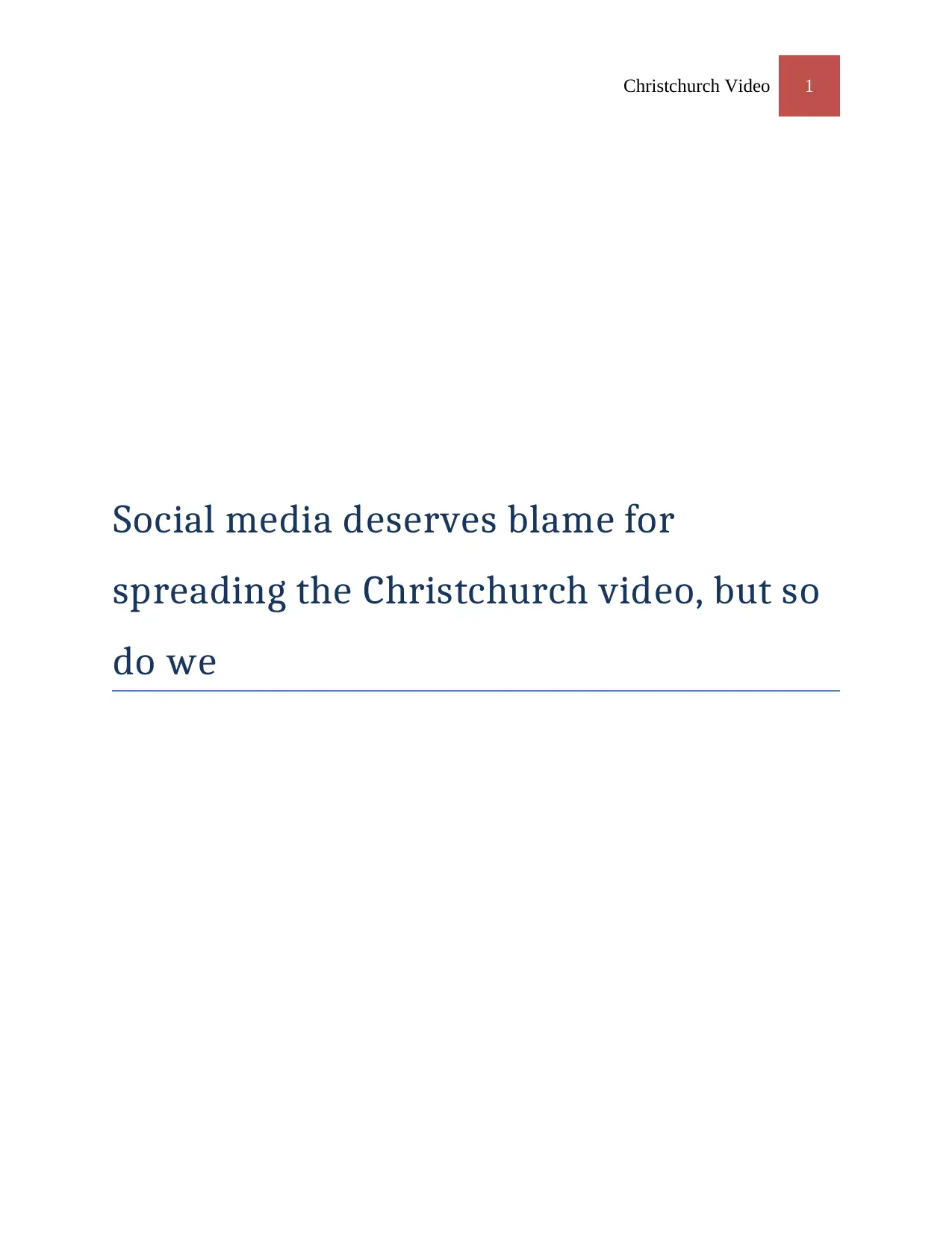
Christchurch Video 1
Social media deserves blame for
spreading the Christchurch video, but so
do we
Social media deserves blame for
spreading the Christchurch video, but so
do we
Paraphrase This Document
Need a fresh take? Get an instant paraphrase of this document with our AI Paraphraser
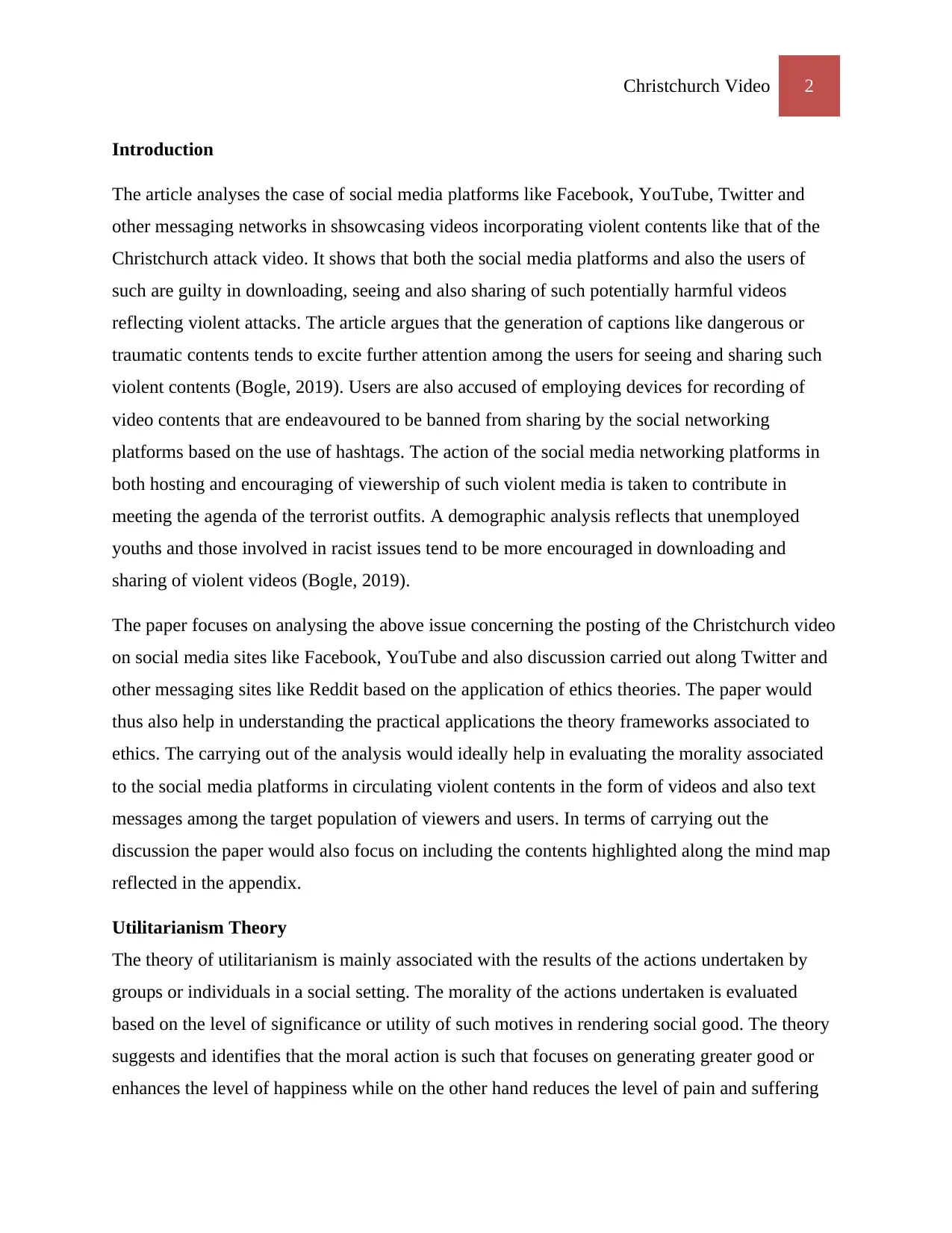
Christchurch Video 2
Introduction
The article analyses the case of social media platforms like Facebook, YouTube, Twitter and
other messaging networks in shsowcasing videos incorporating violent contents like that of the
Christchurch attack video. It shows that both the social media platforms and also the users of
such are guilty in downloading, seeing and also sharing of such potentially harmful videos
reflecting violent attacks. The article argues that the generation of captions like dangerous or
traumatic contents tends to excite further attention among the users for seeing and sharing such
violent contents (Bogle, 2019). Users are also accused of employing devices for recording of
video contents that are endeavoured to be banned from sharing by the social networking
platforms based on the use of hashtags. The action of the social media networking platforms in
both hosting and encouraging of viewership of such violent media is taken to contribute in
meeting the agenda of the terrorist outfits. A demographic analysis reflects that unemployed
youths and those involved in racist issues tend to be more encouraged in downloading and
sharing of violent videos (Bogle, 2019).
The paper focuses on analysing the above issue concerning the posting of the Christchurch video
on social media sites like Facebook, YouTube and also discussion carried out along Twitter and
other messaging sites like Reddit based on the application of ethics theories. The paper would
thus also help in understanding the practical applications the theory frameworks associated to
ethics. The carrying out of the analysis would ideally help in evaluating the morality associated
to the social media platforms in circulating violent contents in the form of videos and also text
messages among the target population of viewers and users. In terms of carrying out the
discussion the paper would also focus on including the contents highlighted along the mind map
reflected in the appendix.
Utilitarianism Theory
The theory of utilitarianism is mainly associated with the results of the actions undertaken by
groups or individuals in a social setting. The morality of the actions undertaken is evaluated
based on the level of significance or utility of such motives in rendering social good. The theory
suggests and identifies that the moral action is such that focuses on generating greater good or
enhances the level of happiness while on the other hand reduces the level of pain and suffering
Introduction
The article analyses the case of social media platforms like Facebook, YouTube, Twitter and
other messaging networks in shsowcasing videos incorporating violent contents like that of the
Christchurch attack video. It shows that both the social media platforms and also the users of
such are guilty in downloading, seeing and also sharing of such potentially harmful videos
reflecting violent attacks. The article argues that the generation of captions like dangerous or
traumatic contents tends to excite further attention among the users for seeing and sharing such
violent contents (Bogle, 2019). Users are also accused of employing devices for recording of
video contents that are endeavoured to be banned from sharing by the social networking
platforms based on the use of hashtags. The action of the social media networking platforms in
both hosting and encouraging of viewership of such violent media is taken to contribute in
meeting the agenda of the terrorist outfits. A demographic analysis reflects that unemployed
youths and those involved in racist issues tend to be more encouraged in downloading and
sharing of violent videos (Bogle, 2019).
The paper focuses on analysing the above issue concerning the posting of the Christchurch video
on social media sites like Facebook, YouTube and also discussion carried out along Twitter and
other messaging sites like Reddit based on the application of ethics theories. The paper would
thus also help in understanding the practical applications the theory frameworks associated to
ethics. The carrying out of the analysis would ideally help in evaluating the morality associated
to the social media platforms in circulating violent contents in the form of videos and also text
messages among the target population of viewers and users. In terms of carrying out the
discussion the paper would also focus on including the contents highlighted along the mind map
reflected in the appendix.
Utilitarianism Theory
The theory of utilitarianism is mainly associated with the results of the actions undertaken by
groups or individuals in a social setting. The morality of the actions undertaken is evaluated
based on the level of significance or utility of such motives in rendering social good. The theory
suggests and identifies that the moral action is such that focuses on generating greater good or
enhances the level of happiness while on the other hand reduces the level of pain and suffering
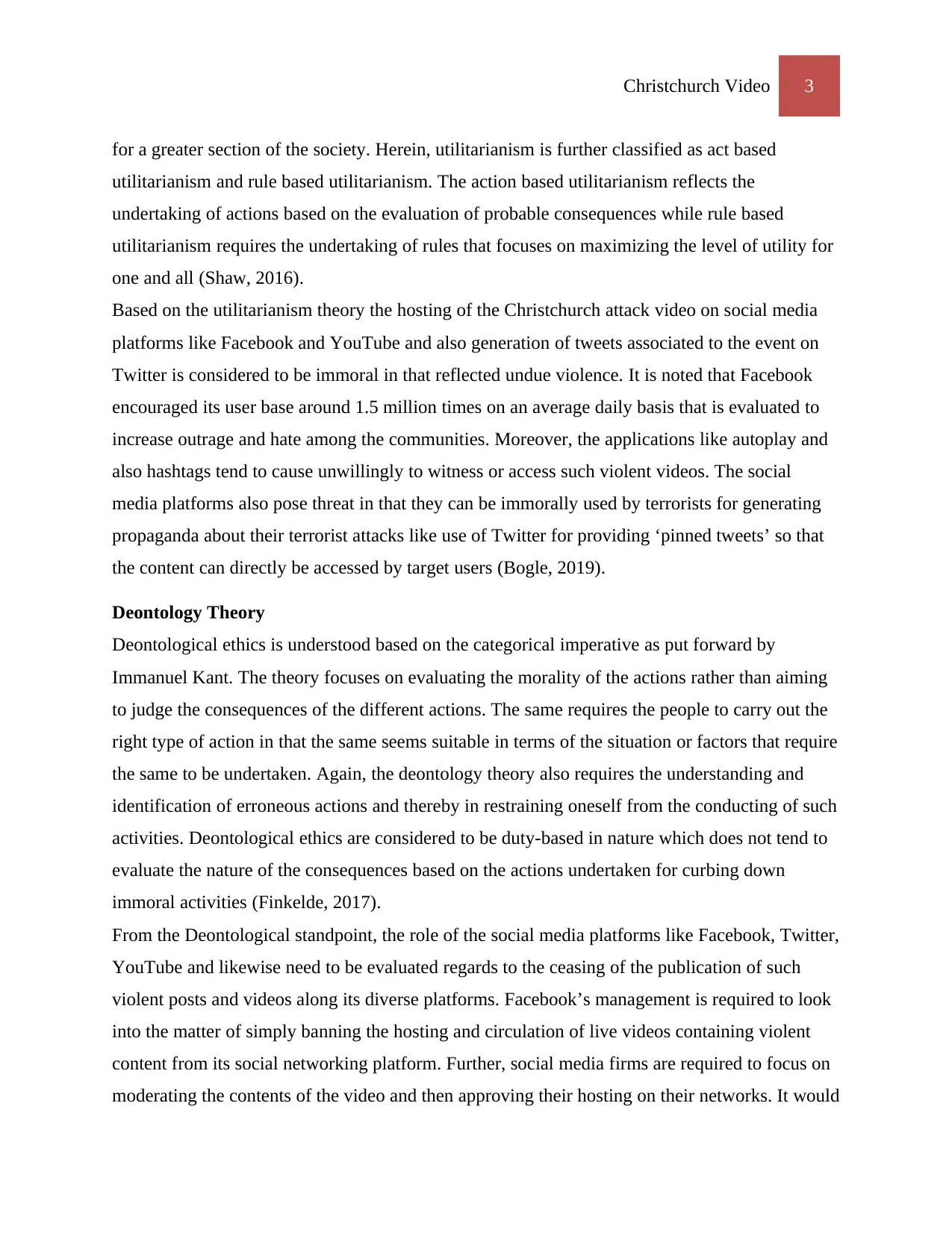
Christchurch Video 3
for a greater section of the society. Herein, utilitarianism is further classified as act based
utilitarianism and rule based utilitarianism. The action based utilitarianism reflects the
undertaking of actions based on the evaluation of probable consequences while rule based
utilitarianism requires the undertaking of rules that focuses on maximizing the level of utility for
one and all (Shaw, 2016).
Based on the utilitarianism theory the hosting of the Christchurch attack video on social media
platforms like Facebook and YouTube and also generation of tweets associated to the event on
Twitter is considered to be immoral in that reflected undue violence. It is noted that Facebook
encouraged its user base around 1.5 million times on an average daily basis that is evaluated to
increase outrage and hate among the communities. Moreover, the applications like autoplay and
also hashtags tend to cause unwillingly to witness or access such violent videos. The social
media platforms also pose threat in that they can be immorally used by terrorists for generating
propaganda about their terrorist attacks like use of Twitter for providing ‘pinned tweets’ so that
the content can directly be accessed by target users (Bogle, 2019).
Deontology Theory
Deontological ethics is understood based on the categorical imperative as put forward by
Immanuel Kant. The theory focuses on evaluating the morality of the actions rather than aiming
to judge the consequences of the different actions. The same requires the people to carry out the
right type of action in that the same seems suitable in terms of the situation or factors that require
the same to be undertaken. Again, the deontology theory also requires the understanding and
identification of erroneous actions and thereby in restraining oneself from the conducting of such
activities. Deontological ethics are considered to be duty-based in nature which does not tend to
evaluate the nature of the consequences based on the actions undertaken for curbing down
immoral activities (Finkelde, 2017).
From the Deontological standpoint, the role of the social media platforms like Facebook, Twitter,
YouTube and likewise need to be evaluated regards to the ceasing of the publication of such
violent posts and videos along its diverse platforms. Facebook’s management is required to look
into the matter of simply banning the hosting and circulation of live videos containing violent
content from its social networking platform. Further, social media firms are required to focus on
moderating the contents of the video and then approving their hosting on their networks. It would
for a greater section of the society. Herein, utilitarianism is further classified as act based
utilitarianism and rule based utilitarianism. The action based utilitarianism reflects the
undertaking of actions based on the evaluation of probable consequences while rule based
utilitarianism requires the undertaking of rules that focuses on maximizing the level of utility for
one and all (Shaw, 2016).
Based on the utilitarianism theory the hosting of the Christchurch attack video on social media
platforms like Facebook and YouTube and also generation of tweets associated to the event on
Twitter is considered to be immoral in that reflected undue violence. It is noted that Facebook
encouraged its user base around 1.5 million times on an average daily basis that is evaluated to
increase outrage and hate among the communities. Moreover, the applications like autoplay and
also hashtags tend to cause unwillingly to witness or access such violent videos. The social
media platforms also pose threat in that they can be immorally used by terrorists for generating
propaganda about their terrorist attacks like use of Twitter for providing ‘pinned tweets’ so that
the content can directly be accessed by target users (Bogle, 2019).
Deontology Theory
Deontological ethics is understood based on the categorical imperative as put forward by
Immanuel Kant. The theory focuses on evaluating the morality of the actions rather than aiming
to judge the consequences of the different actions. The same requires the people to carry out the
right type of action in that the same seems suitable in terms of the situation or factors that require
the same to be undertaken. Again, the deontology theory also requires the understanding and
identification of erroneous actions and thereby in restraining oneself from the conducting of such
activities. Deontological ethics are considered to be duty-based in nature which does not tend to
evaluate the nature of the consequences based on the actions undertaken for curbing down
immoral activities (Finkelde, 2017).
From the Deontological standpoint, the role of the social media platforms like Facebook, Twitter,
YouTube and likewise need to be evaluated regards to the ceasing of the publication of such
violent posts and videos along its diverse platforms. Facebook’s management is required to look
into the matter of simply banning the hosting and circulation of live videos containing violent
content from its social networking platform. Further, social media firms are required to focus on
moderating the contents of the video and then approving their hosting on their networks. It would
⊘ This is a preview!⊘
Do you want full access?
Subscribe today to unlock all pages.

Trusted by 1+ million students worldwide
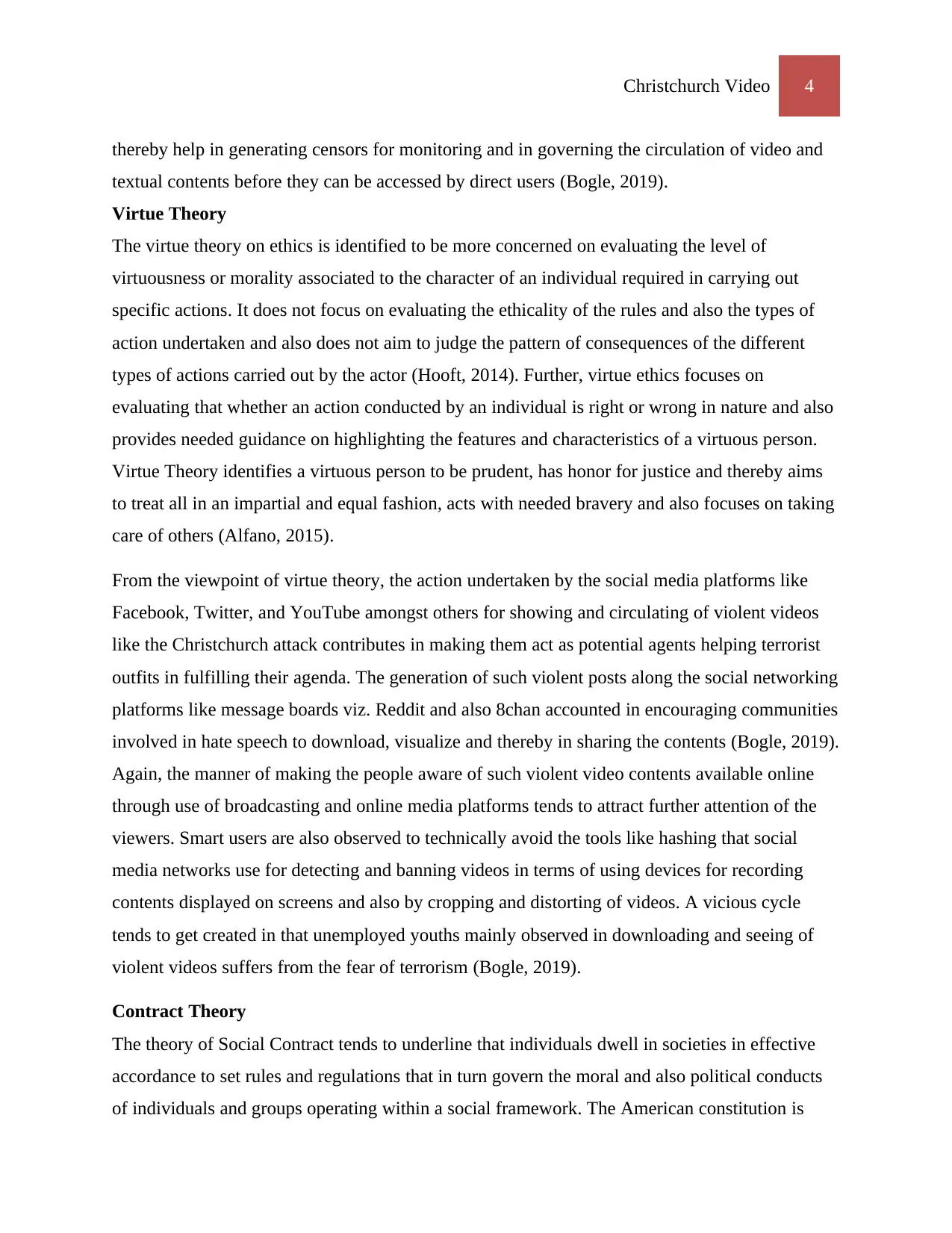
Christchurch Video 4
thereby help in generating censors for monitoring and in governing the circulation of video and
textual contents before they can be accessed by direct users (Bogle, 2019).
Virtue Theory
The virtue theory on ethics is identified to be more concerned on evaluating the level of
virtuousness or morality associated to the character of an individual required in carrying out
specific actions. It does not focus on evaluating the ethicality of the rules and also the types of
action undertaken and also does not aim to judge the pattern of consequences of the different
types of actions carried out by the actor (Hooft, 2014). Further, virtue ethics focuses on
evaluating that whether an action conducted by an individual is right or wrong in nature and also
provides needed guidance on highlighting the features and characteristics of a virtuous person.
Virtue Theory identifies a virtuous person to be prudent, has honor for justice and thereby aims
to treat all in an impartial and equal fashion, acts with needed bravery and also focuses on taking
care of others (Alfano, 2015).
From the viewpoint of virtue theory, the action undertaken by the social media platforms like
Facebook, Twitter, and YouTube amongst others for showing and circulating of violent videos
like the Christchurch attack contributes in making them act as potential agents helping terrorist
outfits in fulfilling their agenda. The generation of such violent posts along the social networking
platforms like message boards viz. Reddit and also 8chan accounted in encouraging communities
involved in hate speech to download, visualize and thereby in sharing the contents (Bogle, 2019).
Again, the manner of making the people aware of such violent video contents available online
through use of broadcasting and online media platforms tends to attract further attention of the
viewers. Smart users are also observed to technically avoid the tools like hashing that social
media networks use for detecting and banning videos in terms of using devices for recording
contents displayed on screens and also by cropping and distorting of videos. A vicious cycle
tends to get created in that unemployed youths mainly observed in downloading and seeing of
violent videos suffers from the fear of terrorism (Bogle, 2019).
Contract Theory
The theory of Social Contract tends to underline that individuals dwell in societies in effective
accordance to set rules and regulations that in turn govern the moral and also political conducts
of individuals and groups operating within a social framework. The American constitution is
thereby help in generating censors for monitoring and in governing the circulation of video and
textual contents before they can be accessed by direct users (Bogle, 2019).
Virtue Theory
The virtue theory on ethics is identified to be more concerned on evaluating the level of
virtuousness or morality associated to the character of an individual required in carrying out
specific actions. It does not focus on evaluating the ethicality of the rules and also the types of
action undertaken and also does not aim to judge the pattern of consequences of the different
types of actions carried out by the actor (Hooft, 2014). Further, virtue ethics focuses on
evaluating that whether an action conducted by an individual is right or wrong in nature and also
provides needed guidance on highlighting the features and characteristics of a virtuous person.
Virtue Theory identifies a virtuous person to be prudent, has honor for justice and thereby aims
to treat all in an impartial and equal fashion, acts with needed bravery and also focuses on taking
care of others (Alfano, 2015).
From the viewpoint of virtue theory, the action undertaken by the social media platforms like
Facebook, Twitter, and YouTube amongst others for showing and circulating of violent videos
like the Christchurch attack contributes in making them act as potential agents helping terrorist
outfits in fulfilling their agenda. The generation of such violent posts along the social networking
platforms like message boards viz. Reddit and also 8chan accounted in encouraging communities
involved in hate speech to download, visualize and thereby in sharing the contents (Bogle, 2019).
Again, the manner of making the people aware of such violent video contents available online
through use of broadcasting and online media platforms tends to attract further attention of the
viewers. Smart users are also observed to technically avoid the tools like hashing that social
media networks use for detecting and banning videos in terms of using devices for recording
contents displayed on screens and also by cropping and distorting of videos. A vicious cycle
tends to get created in that unemployed youths mainly observed in downloading and seeing of
violent videos suffers from the fear of terrorism (Bogle, 2019).
Contract Theory
The theory of Social Contract tends to underline that individuals dwell in societies in effective
accordance to set rules and regulations that in turn govern the moral and also political conducts
of individuals and groups operating within a social framework. The American constitution is
Paraphrase This Document
Need a fresh take? Get an instant paraphrase of this document with our AI Paraphraser
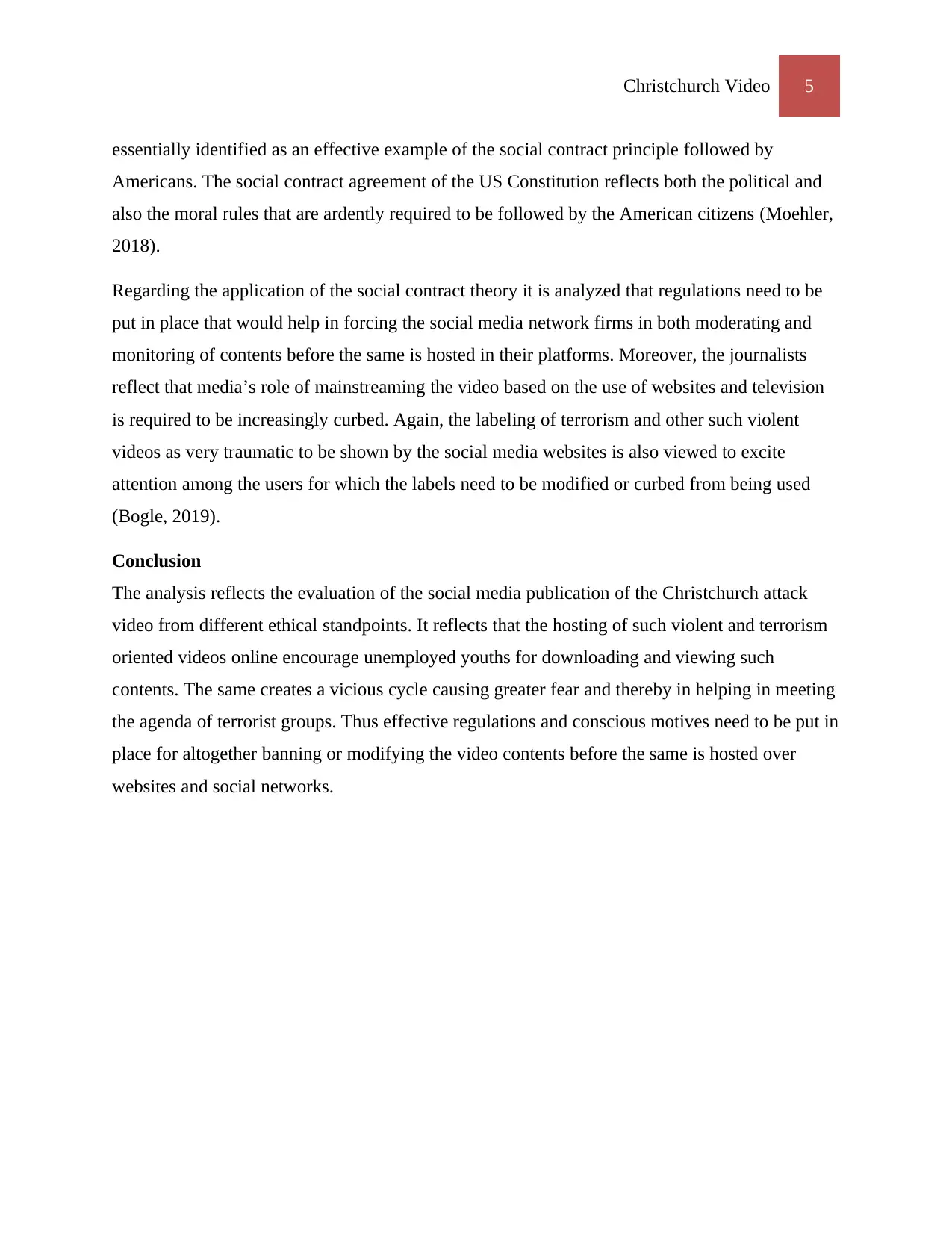
Christchurch Video 5
essentially identified as an effective example of the social contract principle followed by
Americans. The social contract agreement of the US Constitution reflects both the political and
also the moral rules that are ardently required to be followed by the American citizens (Moehler,
2018).
Regarding the application of the social contract theory it is analyzed that regulations need to be
put in place that would help in forcing the social media network firms in both moderating and
monitoring of contents before the same is hosted in their platforms. Moreover, the journalists
reflect that media’s role of mainstreaming the video based on the use of websites and television
is required to be increasingly curbed. Again, the labeling of terrorism and other such violent
videos as very traumatic to be shown by the social media websites is also viewed to excite
attention among the users for which the labels need to be modified or curbed from being used
(Bogle, 2019).
Conclusion
The analysis reflects the evaluation of the social media publication of the Christchurch attack
video from different ethical standpoints. It reflects that the hosting of such violent and terrorism
oriented videos online encourage unemployed youths for downloading and viewing such
contents. The same creates a vicious cycle causing greater fear and thereby in helping in meeting
the agenda of terrorist groups. Thus effective regulations and conscious motives need to be put in
place for altogether banning or modifying the video contents before the same is hosted over
websites and social networks.
essentially identified as an effective example of the social contract principle followed by
Americans. The social contract agreement of the US Constitution reflects both the political and
also the moral rules that are ardently required to be followed by the American citizens (Moehler,
2018).
Regarding the application of the social contract theory it is analyzed that regulations need to be
put in place that would help in forcing the social media network firms in both moderating and
monitoring of contents before the same is hosted in their platforms. Moreover, the journalists
reflect that media’s role of mainstreaming the video based on the use of websites and television
is required to be increasingly curbed. Again, the labeling of terrorism and other such violent
videos as very traumatic to be shown by the social media websites is also viewed to excite
attention among the users for which the labels need to be modified or curbed from being used
(Bogle, 2019).
Conclusion
The analysis reflects the evaluation of the social media publication of the Christchurch attack
video from different ethical standpoints. It reflects that the hosting of such violent and terrorism
oriented videos online encourage unemployed youths for downloading and viewing such
contents. The same creates a vicious cycle causing greater fear and thereby in helping in meeting
the agenda of terrorist groups. Thus effective regulations and conscious motives need to be put in
place for altogether banning or modifying the video contents before the same is hosted over
websites and social networks.
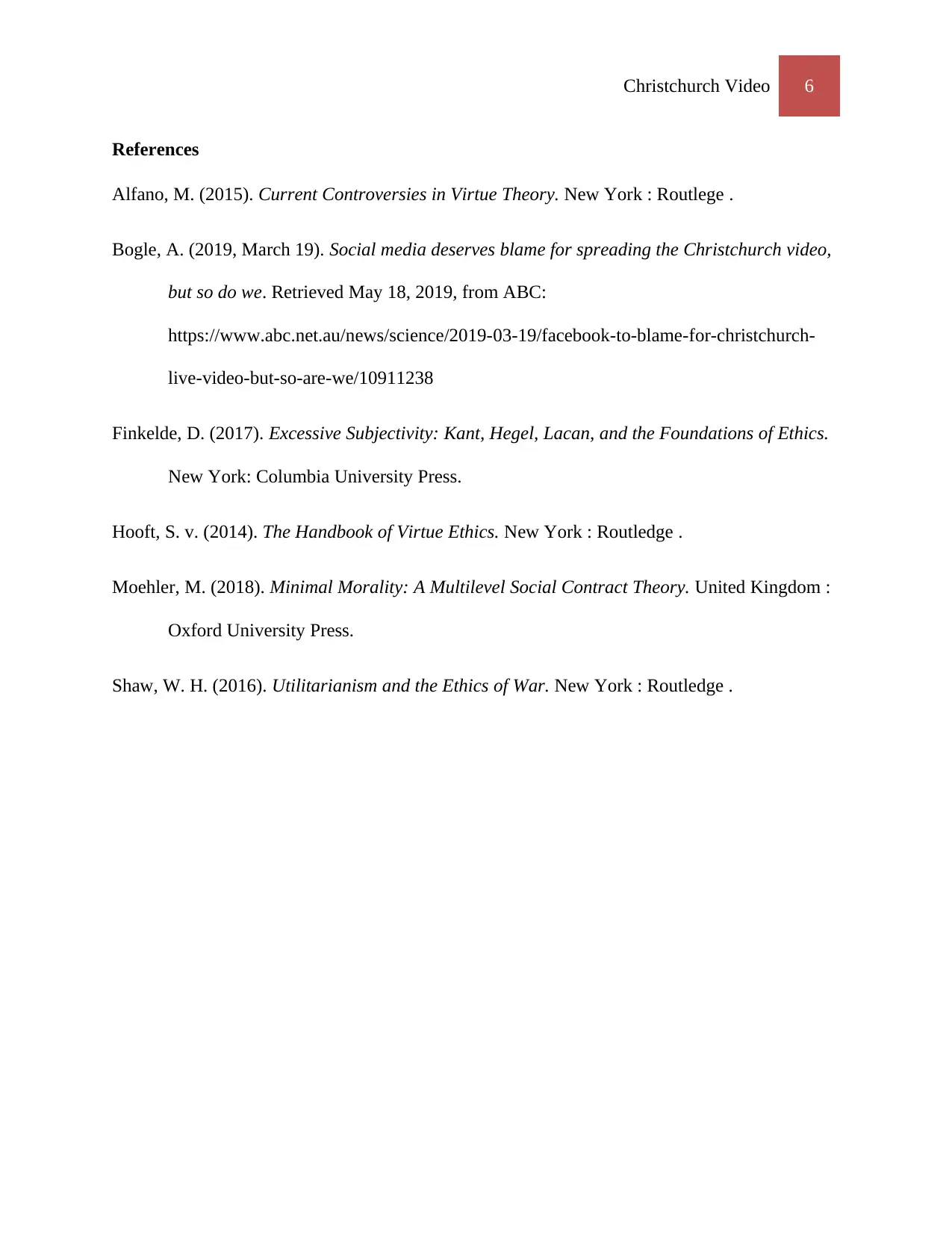
Christchurch Video 6
References
Alfano, M. (2015). Current Controversies in Virtue Theory. New York : Routlege .
Bogle, A. (2019, March 19). Social media deserves blame for spreading the Christchurch video,
but so do we. Retrieved May 18, 2019, from ABC:
https://www.abc.net.au/news/science/2019-03-19/facebook-to-blame-for-christchurch-
live-video-but-so-are-we/10911238
Finkelde, D. (2017). Excessive Subjectivity: Kant, Hegel, Lacan, and the Foundations of Ethics.
New York: Columbia University Press.
Hooft, S. v. (2014). The Handbook of Virtue Ethics. New York : Routledge .
Moehler, M. (2018). Minimal Morality: A Multilevel Social Contract Theory. United Kingdom :
Oxford University Press.
Shaw, W. H. (2016). Utilitarianism and the Ethics of War. New York : Routledge .
References
Alfano, M. (2015). Current Controversies in Virtue Theory. New York : Routlege .
Bogle, A. (2019, March 19). Social media deserves blame for spreading the Christchurch video,
but so do we. Retrieved May 18, 2019, from ABC:
https://www.abc.net.au/news/science/2019-03-19/facebook-to-blame-for-christchurch-
live-video-but-so-are-we/10911238
Finkelde, D. (2017). Excessive Subjectivity: Kant, Hegel, Lacan, and the Foundations of Ethics.
New York: Columbia University Press.
Hooft, S. v. (2014). The Handbook of Virtue Ethics. New York : Routledge .
Moehler, M. (2018). Minimal Morality: A Multilevel Social Contract Theory. United Kingdom :
Oxford University Press.
Shaw, W. H. (2016). Utilitarianism and the Ethics of War. New York : Routledge .
⊘ This is a preview!⊘
Do you want full access?
Subscribe today to unlock all pages.

Trusted by 1+ million students worldwide
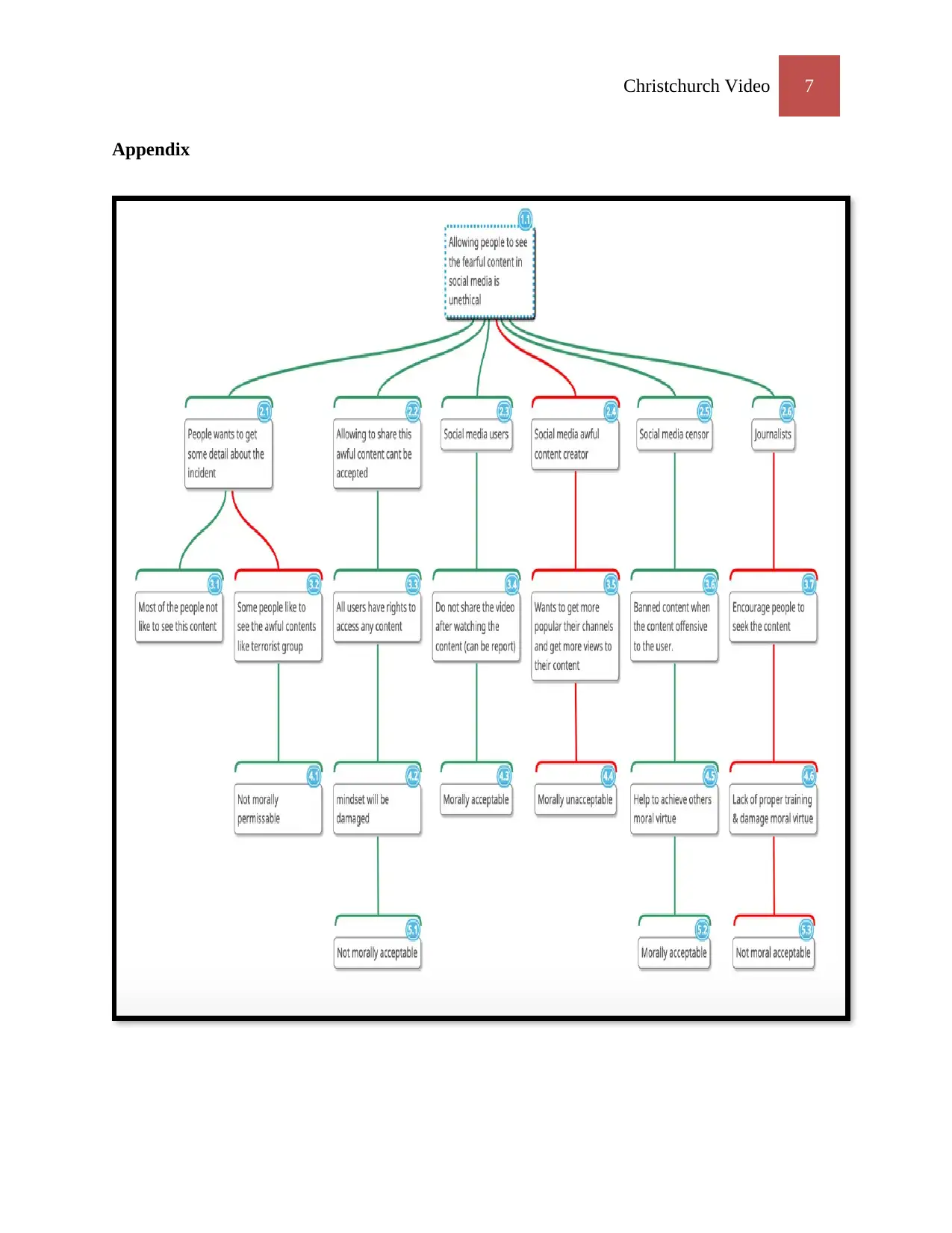
Christchurch Video 7
Appendix
Appendix
Paraphrase This Document
Need a fresh take? Get an instant paraphrase of this document with our AI Paraphraser
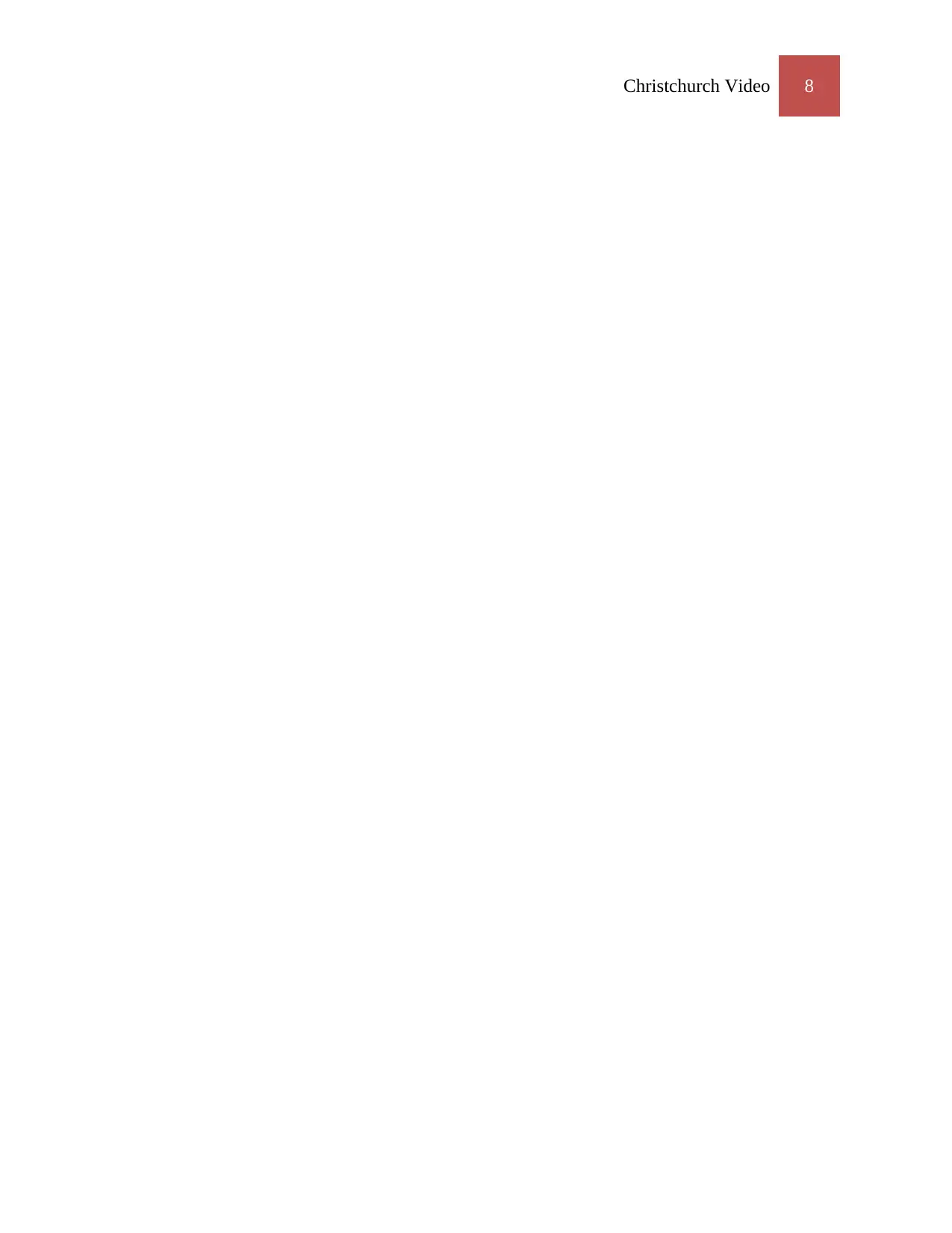
Christchurch Video 8
1 out of 8
Related Documents
Your All-in-One AI-Powered Toolkit for Academic Success.
+13062052269
info@desklib.com
Available 24*7 on WhatsApp / Email
![[object Object]](/_next/static/media/star-bottom.7253800d.svg)
Unlock your academic potential
Copyright © 2020–2026 A2Z Services. All Rights Reserved. Developed and managed by ZUCOL.




